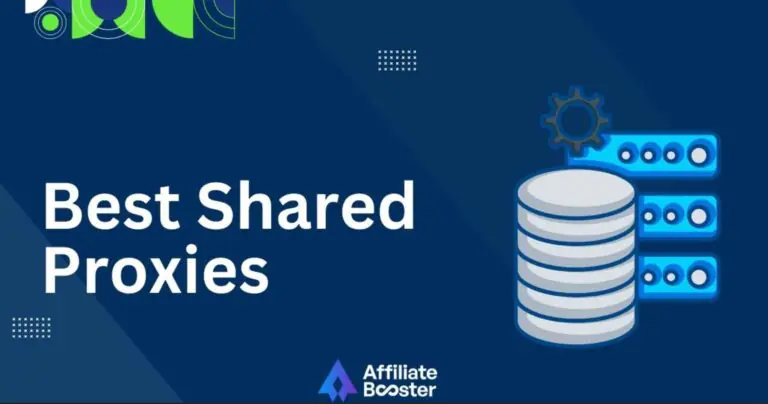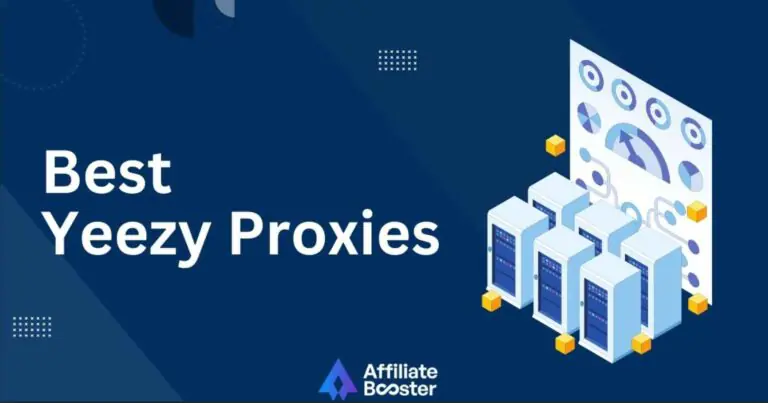
Squid Proxies provides dependable, cost-effective private proxies with unlimited bandwidth and simple setup. It's perfect for beginners and small businesses needing consistent proxy access for tasks like web scraping and social media.
- Affordable pricing
- Unlimited bandwidth
- Easy to use and set up
- Good for web scraping and SEO
- Instant proxy delivery
- Reliable uptime
- No SOCKS5 or mobile proxies
- Speeds can slow during busy times
- Smaller IP pool than premium services
Price: $24
Hey there! If you’re unsure whether Squid Proxies is the right choice, I’m here to help. I’ve used proxies for legal tasks like web scraping and social media management, and know how frustrating it is when services don’t work well or have slow support.
After testing Squid Proxies myself, I’ll explain its features, pricing, speed, privacy, and support in easy terms. I’ll also compare it to IPRoyal, High Proxies, and Bright Data, share which plan suits each, and answer common questions.
This Squid proxies review is made simple for anyone new to proxies or wanting a reliable service. Let’s get in!
What Is Squid Proxies?
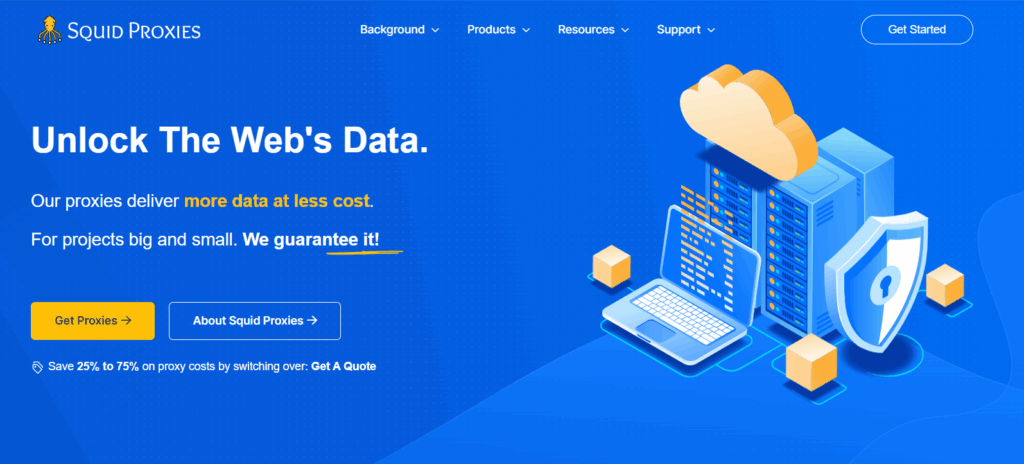
Squid Proxies is a proxy service that started in 2011. It’s a company based in the United States that offers proxies to help you stay anonymous online, access blocked websites, or collect data safely.
Squid Proxies has a network of proxies in multiple countries, including the U.S., Europe, and Asia, with servers in multiple cities and subnets.
They focus on providing fast, secure, and reliable proxies for different tasks like web scraping, SEO research, or browsing privately.
Squid Proxies offers three main types of proxies:
- Private proxies: Dedicated IPs just for you, great for secure tasks.
- Shared proxies: Shared with other users, cheaper but less private.
- Dedicated proxies: Same as private proxies, ensuring high performance.
The company promises high anonymity, unlimited bandwidth, and 24/7 support, making it a popular choice for individuals, marketers, and small businesses. But is it really as good as it sounds? Let’s find out from my experience.
Why I Tested Squid Proxies?
I’ve used proxies for years for legal tasks like:
- Scraping data from websites to track prices for clients.
- Managing multiple social media accounts for marketing.
- Bypassing geo-restrictions to research global markets.
- Browsing anonymously to protect my privacy.
I switched to Squid Proxies because I was having small issues with my previous proxy service, and a friend recommended it. I wanted to see if Squid Proxies could deliver on its promises of speed, reliability, and affordability. To test it, I:
- Signed up for an account and tested private and shared proxies.
- Ran speed tests for browsing, scraping, and accessing geo-blocked content.
- Checked its security features and privacy policies.
- Used the control panel to see how easy it is to manage proxies.
- Contacted customer support to test their responsiveness.
After weeks of testing, here’s what I found.
Pros and Cons of SquidProxies
Pros
- Affordable prices: Starts at $24 for 10 private proxies ($2.40/proxy).
- Fast delivery: Proxies are delivered instantly after payment.
- High anonymity: Elite proxies hide your real IP well.
- Unlimited bandwidth: No limits on data usage for all plans.
- Global locations: Proxies in multiple countries, cities, and subnets.
- 24/7 support: Live chat, email, and a knowledge base are available anytime.
Cons
- No SOCKS5 support: Only HTTP/HTTPS proxies, which may limit some tasks.
- No sneaker proxies: Not suitable for buying limited-edition sneakers.
- Slower during peak times: Speeds can drop when many users are online.
- No free trial: You have to buy a plan to test the service.
- No mobile proxies: Lacks proxies for mobile-specific tasks.
Squid Proxies: Plans and Pricing
Squid Proxies offers a variety of pricing plans to fit different needs. The plans are simple, with no hidden fees, and include unlimited bandwidth, multiple cities/subnets, and 24/7 support.
Private Proxies
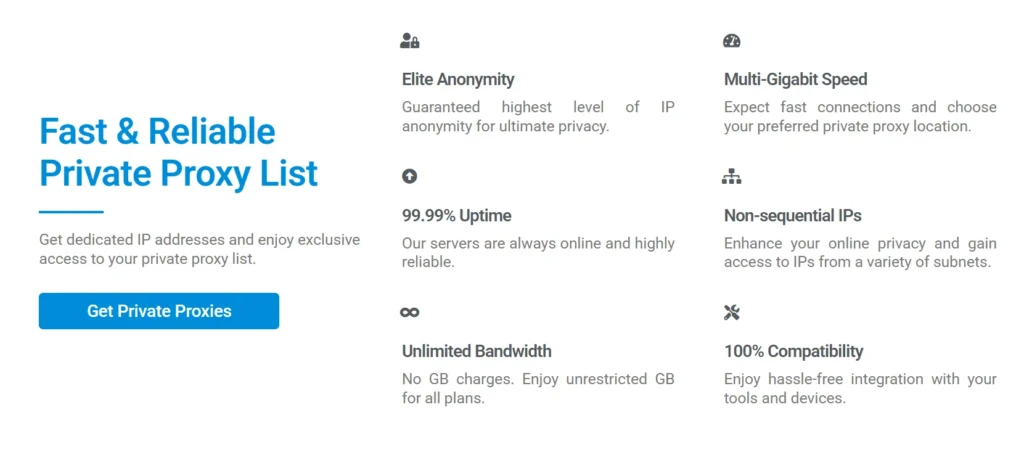
1. SPP-10 Plan (10 Proxies)
- Price: $24/month ($2.40 per proxy).
- Type: Private dedicated proxies.
- Features: Works on all websites, unlimited bandwidth, IPs from 2 cities, 4 subnets.
- Details: High anonymity, dedicated IPs just for you, great for secure tasks.
Who’s this for?
- Beginners: If you’re new to proxies and need a small number for testing, this plan is affordable at $24/month. It’s great for small tasks like browsing or scraping a few websites.
- Freelancers: If you’re scraping data or managing a few social media accounts, 10 proxies are enough to start, and the $2.40 per proxy price is reasonable.
2. SPP-25 Plan (25 Proxies) – Popular Plan
- Price: $48/month ($1.92 per proxy).
- Type: Private dedicated proxies.
- Features: Works on all websites, unlimited bandwidth, IPs from 3 cities, 6 subnets.
- Details: More IPs and locations for better flexibility and performance.
Who’s this for?
- Small businesses: At $48/month, this plan is perfect for businesses needing more proxies for tasks like SEO research or scraping larger websites. The $1.92 per proxy price saves money compared to the 10-proxy plan.
- Marketers: If you’re running multiple social media accounts or doing market research, 25 proxies give you enough IPs to avoid bans.
3. SPP-50 Plan (50 Proxies)
- Price: $87/month ($1.75 per proxy).
- Type: Private dedicated proxies.
- Features: Works on all websites, unlimited bandwidth, IPs from 4 cities, 8 subnets.
- Details: More IPs for bigger projects, with better pricing per proxy.
Who’s this for?
- Growing businesses: If you’re scaling up and need more proxies for scraping, SEO, or automation, this plan offers 50 IPs at a lower cost per proxy ($1.75).
- Researchers: For collecting data from many websites, 50 proxies ensure you don’t get blocked easily.
4. SPP-100 Plan (100 Proxies)
- Price: $160/month ($1.60 per proxy).
- Type: Private dedicated proxies.
- Features: Works on all websites, unlimited bandwidth, IPs from 5 cities, 10 subnets.
- Details: Ideal for larger tasks with more location options.
Who’s this for?
- Medium businesses: At $160/month, this plan suits businesses with bigger needs, like scraping multiple websites or managing many accounts. The $1.60 per proxy price is cost-effective for bulk usage.
- SEO professionals: If you’re tracking search results from different locations, 100 proxies give you plenty of IPs to work with.
5. SPP-200 Plan (200 Proxies)
- Price: $290/month ($1.45 per proxy).
- Type: Private dedicated proxies.
- Features: Works on all websites, unlimited bandwidth, IPs from 6 cities, 12 subnets.
- Details: More IPs and locations for heavy users.
Who’s this for?
- Larger teams: If your team needs proxies for big projects (e.g., scraping thousands of pages), 200 proxies at $1.45 each are a good deal.
- Advanced marketers: For running large-scale campaigns or automation, this plan provides enough IPs to handle the workload.
6. SPP-350 Plan (350 Proxies)
- Price: $455/month ($1.30 per proxy).
- Type: Private dedicated proxies.
- Features: Works on all websites, unlimited bandwidth, IPs from 7 cities, 14 subnets.
- Details: Great for very large projects with many location options.
Who’s this for?
- Big businesses: At $455/month, this plan is for companies with heavy proxy needs, like large-scale scraping or SEO monitoring across many regions.
- Data analysts: If you’re collecting data from hundreds of websites, 350 proxies ensure you can work without interruptions.
7. SPP-500 Plan (500 Proxies)
- Price: $575/month ($1.15 per proxy).
- Type: Private dedicated proxies.
- Features: Works on all websites, unlimited bandwidth, IPs from 8 cities, 16 subnets.
- Details: High volume with a low cost per proxy.
Who’s this for?
- Enterprise users: At $575/month, this plan is for large companies needing many proxies for scraping, SEO, or automation. The $1.15 per proxy price is very affordable for bulk orders.
- Heavy users: If you’re running bots or large projects, 500 proxies give you plenty of IPs to work with.
8. SPP-1000 Plan (1000 Proxies)
- Price: $910/month ($0.91 per proxy).
- Type: Private dedicated proxies.
- Features: Works on all websites, unlimited bandwidth, IPs from 9 cities, 18 subnets.
- Details: Best for massive projects with the lowest cost per proxy.
Who’s this for?
- Large enterprises: At $910/month, this plan is for companies with huge proxy needs, like scraping millions of pages or running large-scale automation. The $0.91 per proxy price is the cheapest for bulk orders.
- Data firms: If your business relies on collecting massive amounts of data, 1000 proxies ensure you can work efficiently.
Shared Proxies
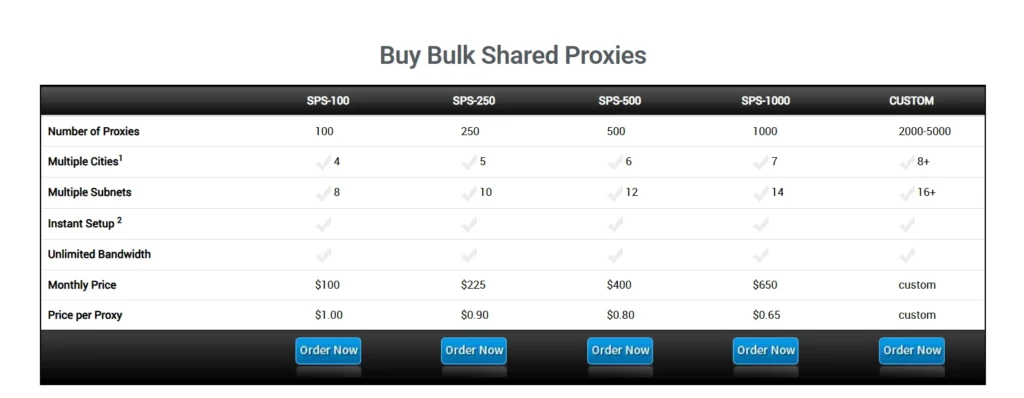
- Price: $100/monthly for 100 proxies ($1 per proxy).
- Type: Shared proxies.
- Features: Elite anonymity, shared by 2-3 users, no GB fees or restrictions.
- Details: Cheaper option for less sensitive tasks.
Who’s this for?
- Budget users: At $1 per proxy, this plan is perfect for students or individuals needing proxies for casual browsing or accessing geo-blocked content.
- Casual users: If you don’t need high security, shared proxies are a cost-effective choice for basic tasks.
Note:
- No free trial: You have to buy a plan to test the service, but there’s a money-back guarantee (details on their website).
- Instant delivery: Proxies are activated immediately after payment, unlike some services that take hours.
- Payment options: PayPal, credit cards, and cryptocurrencies are accepted.
Verdict:
Squid Proxies offers great value with plans starting at $24 for 10 private proxies ($2.40/proxy). The SPP-25 plan ($48/month) is popular for small businesses and marketers.
Shared proxies ($1/proxy) are perfect for budget users. Larger plans like SPP-1000 ($0.91/proxy) suit enterprises with big needs. However, the lack of a free trial might be a downside for some.
What Does Squid Proxies Offer?
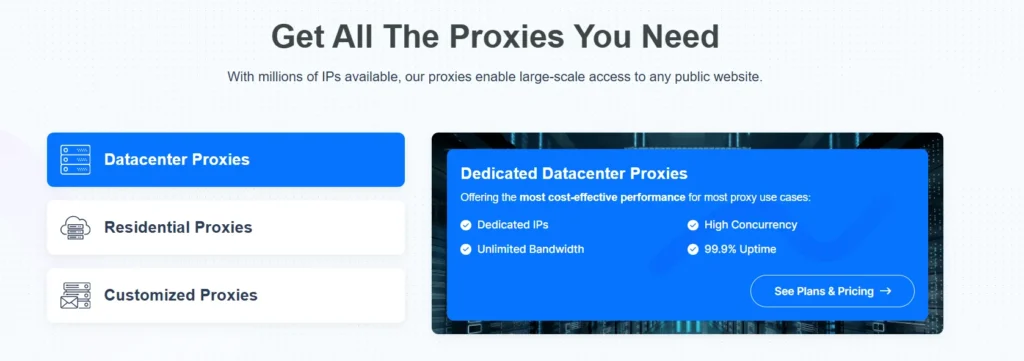
Squid Proxies has a lot of features that make it a good choice for many users. Here’s a detailed look at what you get and how it worked during my tests.
1. Private Proxies
- What it does: Dedicated IPs just for you, offering high anonymity and performance. Supports HTTP/HTTPS protocols.
- Use cases:
- Web scraping: Collect data from websites without getting blocked.
- SEO research: Check search results from different locations.
- Secure browsing: Hide your IP for anonymous surfing.
- My experience: I used private proxies to scrape e-commerce sites for price data. The proxies were reliable, and I didn’t get blocked. Speeds were fast (around 1 Gbps), and I could use unlimited bandwidth without worries.
2. Shared Proxies
- What it does: Shared IPs used by 2-3 users, offering high anonymity but less security. Cheapest option.
- Use cases:
- General browsing: Hide your IP for casual surfing.
- Geo-restrictions: Access content locked to specific regions.
- My experience: I used shared proxies for browsing geo-restricted websites. They worked fine for basic tasks, but speeds were slower (around 10-20 Mbps) due to shared usage. Not ideal for sensitive tasks like scraping.
3. Dedicated Proxies
- What it does: Same as private proxies, exclusively assigned to you for maximum performance.
- Use cases:
- Heavy tasks: Great for scraping, SEO, or automation with high reliability.
- Secure tasks: Ensures no one else uses your IP.
- My experience: Dedicated proxies performed just like private proxies. I used them for SEO research, and the multiple cities/subnets let me check search results from different locations easily.
4. Global Proxy Network
- What it does: Proxies in multiple countries, cities, and subnets (e.g., 9 cities and 18 subnets for the 1000-proxy plan).
- Use cases:
- Geo-restrictions: Access content from different regions.
- Market research: Check websites as if you’re in another country.
- My experience: I used proxies to access a U.K.-only website from the U.S. The global network made it easy to switch locations, and the connection was stable.
5. High-Speed Performance
- What it does: Optimized for fast browsing and data retrieval.
- My experience: Private proxies were super fast (up to 1 Gbps), great for scraping and browsing. Shared proxies were slower, especially during peak times (e.g., evenings), dropping to 5-10 Mbps.
6. User-Friendly Control Panel
- What it does: A simple dashboard to manage proxies, switch IPs, and check usage stats.
- My experience: The control panel was easy to use. I could see my active proxies, change IPs, and monitor bandwidth (unlimited, so no limits). Even beginners would find it simple.
Missing Features:
SquidProxies doesn’t offer SOCKS5 proxies (only HTTP/HTTPS) or sneaker proxies for buying limited-edition sneakers. It also lacks mobile proxies for mobile-specific tasks. If you need these, look at IPRoyal or High Proxies.
Verdict:
Squid Proxies offers solid features for the price, with private, shared, and dedicated proxies covering most tasks. The unlimited bandwidth, global network, and high anonymity are big wins.
However, the lack of SOCKS5, sneaker, and mobile proxies limits its versatility for some users.
Who Should Use Squid Proxies?
- Beginners: The user-friendly control panel and guides make it easy to start.
- Small businesses: Affordable plans and unlimited bandwidth suit tight budgets.
- Marketers: Private proxies are great for scraping and SEO research.
- Budget users: Shared proxies ($1/proxy) offer great value for casual needs.
Who Should Look Elsewhere?
- Sneaker enthusiasts: No sneaker proxies; try IPRoyal or High Proxies.
- Advanced users: No APIs or mobile proxies; Bright Data or Oxylabs are better.
- Privacy-focused users: A no-logs VPN offers stronger anonymity.
Overall, Squid Proxies delivers excellent value for its price. It’s not the most advanced, but it’s a reliable, budget-friendly option for most proxy needs.
Speed and Performance
Speed is important for proxies, especially for tasks like scraping, browsing, or accessing geo-blocked content. I ran speed tests to see how Squid Proxies performs.
Test Results
- Private proxies: Very fast, with download speeds up to 1 Gbps. Upload speeds were around 500 Mbps. Great for scraping and SEO.
- Shared proxies: Slower, with speeds around 10-20 Mbps. Dropped to 5-10 Mbps during peak times (e.g., evenings).
- Dedicated proxies: Same as private proxies, with speeds up to 1 Gbps. Very reliable.
Verdict:
Squid Proxies delivers fast speeds for private proxies, making them great for scraping, SEO, and browsing. Shared proxies are slower, especially during peak times, and are best for casual tasks.
For gaming or torrenting, you’ll need a faster service or VPN.
Use Cases of SquidProxies
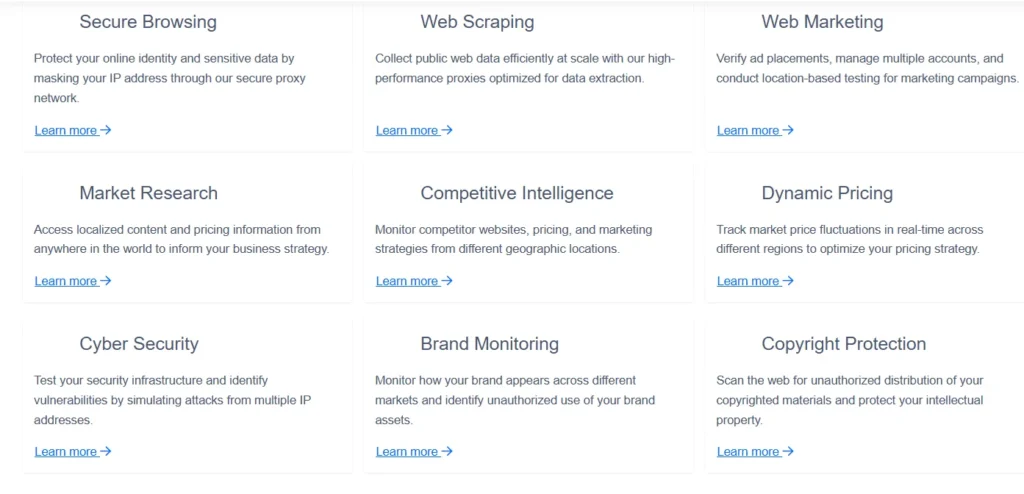
- Browsing: Private proxies were fast for general browsing (e.g., checking websites). Shared proxies were okay but lagged during peak times.
- Web scraping: Private proxies handled large-scale scraping with no issues. Shared proxies were too slow for big projects.
- SEO research: Private proxies were excellent for checking search results from different locations. Speeds were consistent.
- Streaming: Private proxies worked for streaming (e.g., YouTube) but not great for high-quality videos due to occasional buffering. Shared proxies lagged a lot.
- Gaming: Not ideal. Proxies had too much latency for online gaming (e.g., Fortnite).
- Torrenting: Proxies were slow for torrenting, and some sites blocked shared IPs. A VPN like NordVPN is better for this.
Security and Privacy
Proxies are all about keeping your online activity safe and private. I checked Squid Proxies’ security features and privacy policies to see how they perform.
Security Features
- High anonymity: Elite HTTP/HTTPS proxies hide your real IP, making it look like you’re a regular user. This worked well in my tests.
- IP authentication: Proxies support username/password or IP authentication for secure access.
- Multiple subnets: IPs from different subnets reduce the risk of bans.
- Robust infrastructure: Multiple servers ensure high availability and security.
Privacy Policy
- Data logging: Squid Proxies doesn’t clearly state a no-logs policy. It likely logs some data (e.g., IP usage or billing info), which is common for proxy services but less private than top VPNs.
- U.S.-based: The U.S. has strict data laws, which could affect privacy if authorities request info. There’s no evidence Squid Proxies shares data, but it’s worth noting.
- Ethical IPs: The company uses clean IPs, reducing the risk of blacklisting.
Verdict:
Squid Proxies offers good security with elite proxies and robust infrastructure. It’s safe for most users, especially for scraping, SEO, or browsing.
However, the lack of a clear no-logs policy means it’s not ideal for maximum privacy. Pair it with a VPN or choose a no-logs VPN for sensitive tasks.
Are Squid Proxies Safe to Use?
- Squid Proxies are safe for legal tasks like web scraping, SEO research, or browsing. The high-anonymity proxies protect your identity.
- For sensitive tasks (e.g., bypassing censorship in restrictive countries), Squid Proxies isn’t as secure as a no-logs VPN like ExpressVPN due to potential logging.
Ease of Use
A good proxy service should be easy to set up and use, especially for beginners. I tested Squid Proxies’ sign-up process, control panel, and overall user experience.
Sign-Up Process
- How it works: Sign up with an email, choose a plan, and pay via PayPal, credit card, or cryptocurrency. Proxies are delivered instantly.
- My experience: Signing up was quick (about 2 minutes). I paid via PayPal, and my proxies were ready immediately. This was much faster than other services I’ve used, which took hours.
Control Panel
- What it does: The control panel lets you manage proxies, switch IPs, and check usage stats. It’s simple and clean.
- My experience: The control panel was very easy to use. I could see my active proxies, change IPs, and monitor bandwidth (unlimited, so no worries). It’s perfect for beginners.
Setup Guides
- What it does: Squid Proxies offers setup guides for configuring proxies on browsers, bots, or apps.
- My experience: The guides were clear, with step-by-step instructions for setting up proxies on Chrome and Scrapebox. I had no trouble getting started.
Verdict:
Squid Proxies is super beginner-friendly. The sign-up is fast, the control panel is simple, and the guides make setup easy. The instant delivery is a big plus!
Customer Support of Squid Proxies
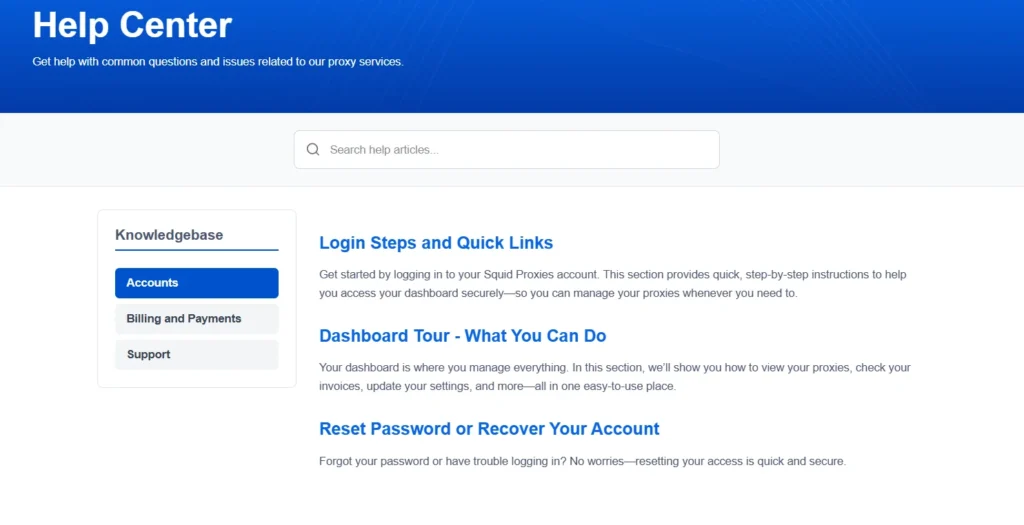
Good support is important if you run into issues. I tested Squid Proxies’ customer support to see how helpful they are.
SquidProxies provides support through a ticket system where users can submit detailed requests. You fill in your name, email, subject, and message, choose the support department and priority level, and then send your ticket.
This organized process helps ensure your issues are tracked and addressed efficiently by their team.
Squid Proxies vs. The Competition
Squid Proxies is affordable and reliable, but how does it compare to other proxy services? I looked at IPRoyal, High Proxies, and Bright Data to see where it stands.
1. Squid Proxies vs. IPRoyal
- Network size: Squid Proxies has proxies in multiple countries; IPRoyal has 34 million IPs (mostly residential).
- Pricing: Squid Proxies is cheaper for private proxies ($2.40/proxy vs. IPRoyal’s $1.75/GB residential). IPRoyal offers sneaker and mobile proxies, which Squid Proxies lacks.
- Features: Squid Proxies has a user-friendly control panel; IPRoyal offers a browser extension.
- Who’s it for?: Squid Proxies is better for scraping and SEO on a budget. IPRoyal suits sneaker copping or mobile proxy needs.
2. Squid Proxies vs. High Proxies
- Network size: Both have similar networks (Squid Proxies: multiple countries; High Proxies: 50,000+ IPs).
- Pricing: High Proxies is cheaper ($1.20/month private vs. Squid Proxies’ $2.40/proxy). High Proxies offers social media and classified ad proxies.
- Features: Squid Proxies has faster delivery and a global network; High Proxies has specialized proxies.
- Who’s it for?: Squid Proxies is great for scraping and SEO. High Proxies is better for social media and classified ads.
3. Squid Proxies vs. Bright Data
- Network size: Bright Data has 72 million IPs (much larger than Squid Proxies).
- Pricing: Bright Data is expensive ($8/GB residential vs. Squid Proxies’ $2.40/proxy).
- Features: Bright Data offers web scraping APIs and mobile proxies. Squid Proxies is simpler with no APIs.
- Who’s it for?: Bright Data is for enterprises needing huge networks. Squid Proxies is for individuals and small businesses on a budget.
👉Read Detailed Bright Data Review
Verdict:
Squid Proxies is a budget-friendly option with fast delivery and reliable proxies for scraping and SEO.
It’s not as feature-rich as Bright Data or as versatile as IPRoyal, but its low prices and performance make it great for small projects. For social media or classified ads, try High Proxies.
Final Verdict: Is Squid Proxies Worth It?
SquidProxies is a good choice if you need simple, fast, and affordable proxies. It works great for web scraping, SEO research, and data collection. Setup is quick, pricing is fair, and the proxies are reliable.
It is not perfect, though. There is no SOCKS5, no mobile proxies, and the refund policy is conditional. If you need advanced features, look elsewhere.
But for most users — marketers, scrapers, and small businesses — SquidProxies does the job well without burning a hole in your pocket.
Buy it if: You need clean dedicated IPs for scraping or SEO on a budget.
Skip it if: You need SOCKS5, mobile proxies, or a no-questions-asked refund.
Quicklinks:
- HydraProxy Review: Best Residential & Mobile Proxy Provider?🚀
- MyPrivateProxy Review: World-leading Private Proxies provider?
- IPRoyal Review: Ultimate Proxy Solution for Businesses?
- Webshare Review: Is This Proxy Service Worth It?
- PacketStream Review: Is This Proxy Service Worth It?
FAQ: Squid Proxies Review 2026
❓Is Squid Proxies safe to use?
Yes, Squid Proxies is safe for legal tasks like web scraping, SEO research, or browsing. Its elite proxies hide your IP well. However, it may log some data, so it’s not as private as a no-logs VPN.
❓Can I choose my proxy location with SquidProxies?
Not during checkout. Locations are assigned automatically. If you need a specific city or country, you have to raise a support ticket after purchase and request it. They support 40+ datacenter locations worldwide.
❓Is the 7-day money-back guarantee automatic?
No. It is conditional. You need to submit a support ticket explaining your issue. SquidProxies will try to fix the problem first. They only issue a refund if the issue genuinely cannot be resolved. So it is not a “no questions asked” guarantee.
❓ Does SquidProxies keep logs of my activity?
SquidProxies does not publish a strict no-logs policy. As a US-based company, they likely store some usage or billing data. For everyday tasks like scraping and SEO, this is fine. If you need maximum anonymity, pair it with a no-logs VPN.
